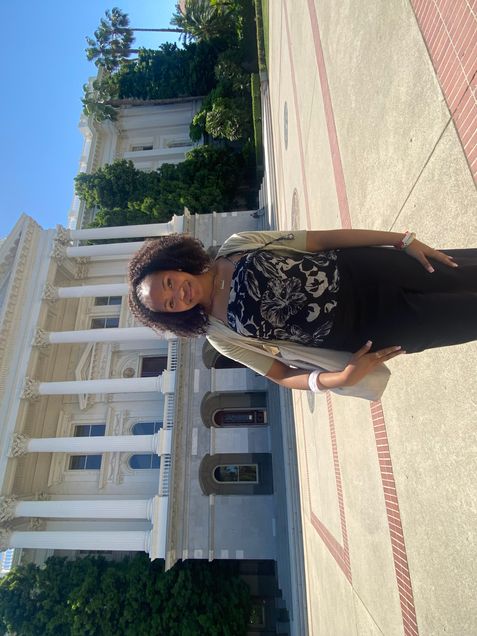KIP Student Feature – Victoria Asemota
 Victoria Asemota (Sargent’27, Health Science) combined health and justice work at her Summer internship with E.C. Reems’ Live Life Well project. E.C. Reems is a 501(c) 3 nonprofit founded in 1989.
Victoria Asemota (Sargent’27, Health Science) combined health and justice work at her Summer internship with E.C. Reems’ Live Life Well project. E.C. Reems is a 501(c) 3 nonprofit founded in 1989.
Q&A with Victoria Asemota
Could you give us a brief description of the organization you are interning with and what your primary responsibilities are during this internship?
This summer, I interned with Live Life Well, a public health initiative supported by EC Reems and community partners in Alameda County, dedicated to addressing tobacco-related health inequities. The organization focuses on reducing the disproportionate toll of tobacco use, particularly among youth, low-income communities, and communities of color, through advocacy, education, and policy change. My responsibilities included developing and presenting research on tobacco prevention, coordinating a culturally grounded Juneteenth health event, creating public-facing materials, and helping organize a Tobacco Enforcement Panel to promote stronger local regulation. I also contributed to an op-ed campaign and participated in legislative advocacy during California’s Information & Education Days.
What area(s) of justice does this organization work in and how did your internship help promote/fulfill these justice goals?
Live Life Well operates at the intersection of health justice, racial equity, and environmental health, addressing how tobacco use disproportionately affects communities based on race, income, and geography. My internship directly advanced these goals by helping amplify community voices through civic engagement events, shaping public narratives with data-driven advocacy, and supporting policy change aimed at reducing youth exposure to e-cigarettes and other tobacco products. Through public health communications and community organizing, I contributed to the organization’s mission to eliminate tobacco-related health disparities.
Has your work this summer changed how you think about justice issues?
Yes, this experience deepened my understanding that justice is not only about access to care but also about changing the conditions that shape health behaviors and outcomes. I saw firsthand how flavored tobacco and electronic smoking devices are aggressively marketed in communities like mine, while policy infrastructure and funding for cessation remain under-resourced. Justice now, to me, means equipping local leaders and youth with tools to push back, through education, policy, and coalition-building.
How did you find out about this internship, and what advice would you give to students hoping to apply for this funding opportunity in the future?
I learned about the Live Life Well internship through my public health network in Oakland and my involvement with youth anti-tobacco coalitions. For students applying for this funding, I recommend identifying organizations whose missions align with your values and being proactive about how your skills can support their work. Your impact doesn’t have to come from a formal job posting, many community-based organizations welcome students who come with initiative, cultural humility, and a passion for change.
How has the Kilachand coursework and/or the KIP summer mentoring sessions helped prepare you for the work you are doing during your internship?
Kilachand coursework taught me how to think interdisciplinarilly and critically about structural inequities, while the KIP summer mentoring sessions gave me the space to reflect on the “why” behind the work. These spaces emphasized not just professional growth but ethical leadership, preparing me to approach community-based work with care, collaboration, and clarity of purpose. Whether drafting policy-facing op-eds or planning health equity events, I felt grounded in both my academic training and my community’s needs.
Learn more about the Kilachand Internship Program here.